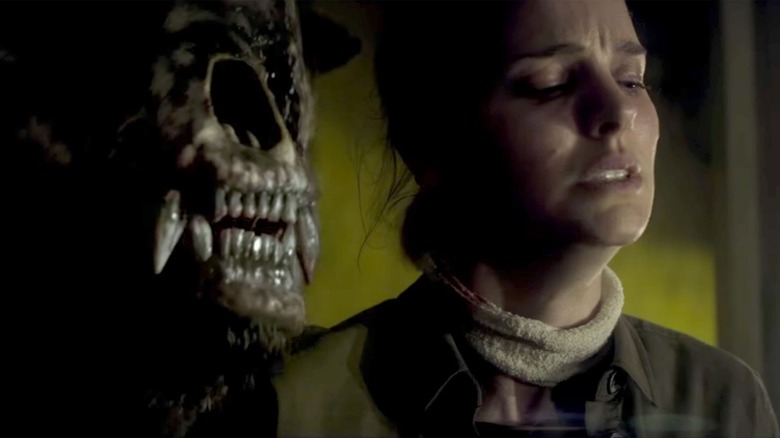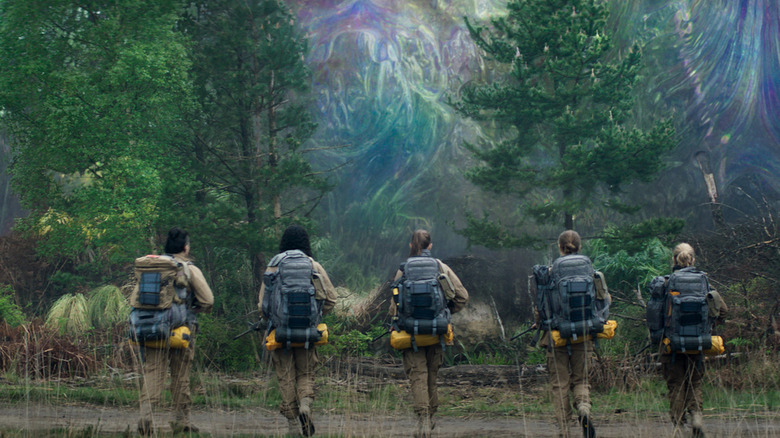Why Annihilation Bombed At The Box Office, And What We Can Learn From It
Alex Garland has become a highly respected filmmakers in recent years, having directed films like the Oscar-winning "Ex-Machina" and writing genre classics like "28 Days Later." But it was in 2018 that Garland arguably took his biggest creative swing with "Annihilation," a heady, terrifying sci-fi nightmare that boasted a female-fronted cast led by Natalie Portman, Tessa Thompson, Gina Rodriguez, and Jennifer Jason Leigh. Based on the acclaimed novel by Jeff VanderMeer, the project had an awful lot going for it — especially since this served as Garland's follow-up to his directorial breakout, "Ex-Machina."
Unfortunately, the film didn't pan out as anyone planned from a commercial standpoint. With a bigger cast, bigger ideas, and a bigger budget than his feature directorial debut, this film seemed poised to become a potential breakout hit. Instead, it was all but dumped by Paramount Pictures at the 11th hour. So, what happened exactly? Why did "Annihilation" seemingly flop at the box office? And does that box office figure truly paint an accurate picture of the movie's success?
In this case, not really.
A studio conflict and lack of confidence
Paramount was quick to sign up to make "Annihilation" with Alex Garland in 2014, but at the time, the studio was run by Brad Grey and Rob Moore. In the years between the deal being made and the film's release, a regime change happened. That, coupled with the fact that Skydance was a co-producer on the film, led to multiple cooks in the kitchen. That is at the heart of this movie's seemingly lackluster $43 million worldwide box office haul.
On one side of the table, we had Scott Rudin ("The Social Network") of Paramount, with Skydance head David Ellison ("Terminator: Genisys") on the other. A report from THR in 2017 indicated that these two were at odds over "Annihilation," with Garland caught in the middle. Reports indicate that the film didn't perform well with audiences at test screenings, leading to different ideas on how to handle the release. Ellison, wanting to avoid another bomb following "Geostorm," was looking to make major changes to the movie, including changing the ending, so that it might become more audience-friendly. Rudin, meanwhile, is said to have sided with Garland.
In the end, Garland got to release his version of the film to critical acclaim, but that came at a cost. The studios opted to go with a unique distribution strategy (at least at the time) that would involve releasing the film in theaters in the U.S., Canada, and China. As for the rest of the world? They would be left to stream it on Netflix.
The Netflix deal
The producers and studios ultimately decided to find a new distributor for the film outside of North America and China. At the time, Netflix was by far the biggest streaming service in Hollywood, with HBO Max, Disney+, Peacock, Apple TV+, and others still a couple years away. There was a sense that if a studio sold a movie's rights to Netflix it was being "dumped," signaling a lack of confidence. This was similarly done with "The Cloverfield Paradox" around the same time.
So, Paramount and Skydance cut a deal with Netflix that would see them take all of the remaining international rights to "Annihilation," releasing the film a mere 17 days after it premiered in theaters. That 17 day window probably had to do with combating piracy during the initial theatrical release in North America. In any event, with most of the world off the board, this movie had little hope of becoming a hit purely based on ticket sales. Rather, Netflix covered a sizable amount of the budget, said to be between $40 and $55 million, taking a great deal of the financial risk out of it for both Paramount and Skydance.
Box office performance
"Annihilation" was released in theaters in the U.S. on February 23, 2018. It didn't perform particularly well in its opening weekend, placing fourth with $11 million behind the likes of "Peter Rabbit," "Game Night," and "Black Panther." Not to mention that other hits like "The Greatest Showman" and "Jumanji: Welcome to the Jungle" were in the top 10 that weekend as well. Not only did Paramount sell most of the rights to Netflix, but they picked a downright awful weekend to release the movie domestically.
In the end, it finished its domestic run with $32.7 million, with $10.3 million from China for a grand total of $43 million. If we assume that the budget was closer to $40 million than $55 million, that's actually not too bad considering that Netflix shelled out to cover most of the budget for the streaming rights. When we factor in the estimated $7.5 million in domestic Blu-ray and DVD sales, along with cable rights and any digital rentals, this may have actually made some money for the studio. Or, at the very least, it wouldn't be fair to label it an outright flop. It's just that the numbers don't look overly impressive because most people on the planet weren't given the chance to see it in a theater.
The lessons contained within
In reflecting on the release of "Annihilation," several things stick out. For one, mid-budget movies can be tricky because sure, that $40 million isn't necessarily a lot, but when a studio has to market that movie effectively, suddenly its box office take has to be a whole lot more. If something exists in an uncertain gray area (such as this movie did with the brass at Paramount and Skydance), from a business perspective, it's not overly difficult to understand why they hit the panic button, especially since this film is not exactly a straightforward, crowd-pleasing ride. It's very much an artistic expression that blends horror and sci-fi with big ideas. A whole lot of people love it, but it's not for everyone.
The box office results were not at all terrible given the extremely heavy competition in North America at that time. Had the studio found a better release window and exercised confidence in Garland's vision, there is absolutely a world where "Annihilation" could have become a decent hit at the box office without the Netflix deal. Studios are businesses first and foremost, but when that business is driven by art and creative people, sometimes a leap of faith and confidence in that art is required. In this case, the powers that be lacked the confidence to take that leap.




